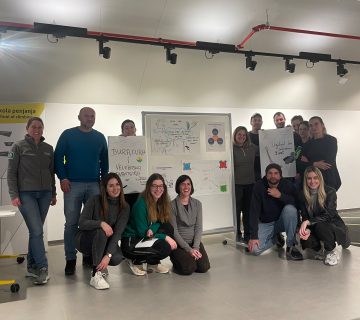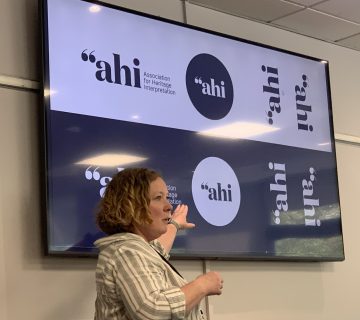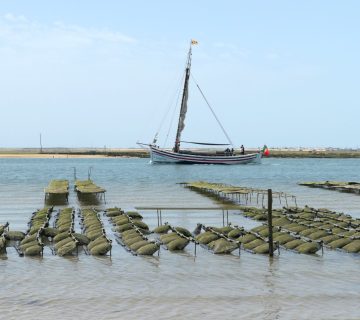Many IE trainers honed their skills together as the Lym fjord in Istria, Croatia, hosted the first ever summer school for them.
Besides team-building and bonding, the primary reason for IE trainers to gather in person for a five-day long training was to acquaint themselves with the principles of value-based heritage interpretation and discuss its applicability in the IE training courses.
23 trainers from 12 countries, from Portugal to Hungary and from Greece to Sweden, worked hard all day long, but also found time to enjoy time on the beach, feast on local food and discover the natural and cultural heritage of Istria. While the term ‘value-based heritage interpretation’ has been used for some time, there were very few opportunities for the trainers to explore and discuss the ideas behind it.
A summer school for IE trainers had been on IE’s wish list for some years, but with the covid-19 pandemic and lack of financial support, it remained on the wish list until now. Finally, this school was organised within the Learning landscape initiative for 2024, with the help of UNESCO’s co-financing.
Ever since the UNESCO Regional Bureau for Science and Culture in Venice published recommendations for this approach in 2019, the main developer of IE’s training programme, Thorsten Ludwig, has worked hard to adapt all IE certification courses to them. UNESCO’s aim is that IE trainers offering their service within the Learning landscape initiative can pass on these ideas and know-how to UNESCO sites and areas surrounding them.
However, dealing with environmental and social sustainability is no longer in the domain of the United Nations only, and value-based products and services seem to be a promise of a better future, including when it comes to heritage interpretation. IE trainers should, therefore, in future, run courses according to the new programme which even more emphasises the importance of a dialogue between people and interpreters, encouraging even more self-interpretation, and renegotiating various narratives about heritage which might be only one-sided interpretations.
Guides, writers, planners and other interpreters will be even more able to direct our thinking and emotional processes towards active listening and active communication in order for visitors to see, hear and consider various points of view. These aspects give the value-based interpretation its name. Interpreters are sometimes worried that they need to reinforce values upon people, but this can’t be farther from IE’s proposition. The mode of interpretive presentation, active listening and opening space for people to interact are at the heart of the proposed approach to interpretation. To the satisfaction of many trainers, this is not far away from what they were already practising all these years; the renewed training programme only emphasises further a dialogue and an open space as currently the best tools for self-interpretation by people.
Let’s hear from some of our IE trainers who participated in this year’s summer school:
“The Summer School was a rare opportunity for a get-together of so many Interpret Europe trainers. Five intense days together gave all of us a chance to discover more about each other. Learning how many unusual and inspiring persons we have in our training network is my biggest discovery. If anyone considers joining one of our trainings, it doesn’t matter which trainer you choose – I am now certain that you are in good hands. Buckle up and get ready for a journey full of discoveries.” (Iva, Croatia)
“You always learn and re-learn, get inspired, gain new perspectives among IE’s Certified Interpretive Trainers (CITs). Meeting in person during the summer school elevated these to another level.” (Zsuzsa, Hungary)
“As interpretation is about connection, nothing less could happen between so many interesting and inspiring people that gathered with a summer mood in a forest by the sea. Meetings and exchanges that offer new paths and new friends.” (Penelope, Greece)
“Amazing summer camp: an alive picture of diversity and compromise with interpretation from the training team. I hope it will be the first of many!” (Evarist, Spain)
“I learned from the different experiences with other participants here that there should always be enough space to understand one more perspective.” (Arpad, Hungary)
“To meet and learn together with all these experienced trainers and nice persons has been so rewarding and fun!” (Per, Sweden)
“I have a sense of time well spent. I leave with satisfaction and a sense of training fulfilment. It was a fantastic work, laugh and talk. I already miss my training colleagues.” (Mateusz, Poland)
“Meeting all the trainers in the House of Nature in Kontija was a great experience! All our meaningful conversations about value-based heritage interpretation reminded me of how much I enjoy being a part of our inspiring interpreters’ tribe.” (Vida, Croatia)
With these ideas, and upskilled trainers, we are entering the first phase in the Learning landscapes initiative. Right now, the call for participation is closing and the UNESCO areas that have applied to take part are being selected. In autumn, the representatives of participating areas will become newly trained interpretive agents who will start engaging their local communities in the interpretive process and gather for face-to-face training in Kotor (Montenegro). Then next year, the training and planning process will take place.
You can read more about the whole Learning landscapes initiative in the article published in the previous edition of IE’s newsletter.
To cite this article: IE Management (2024) ‘Back to school to practice value-based interpretation‘ in Interpret Europe Newsletter 2-2024, pg.5-6.
Available online: https://interpret-europe.net/wp-content/uploads/2024/07/PDF-Newsletter-2024_2.pdf




